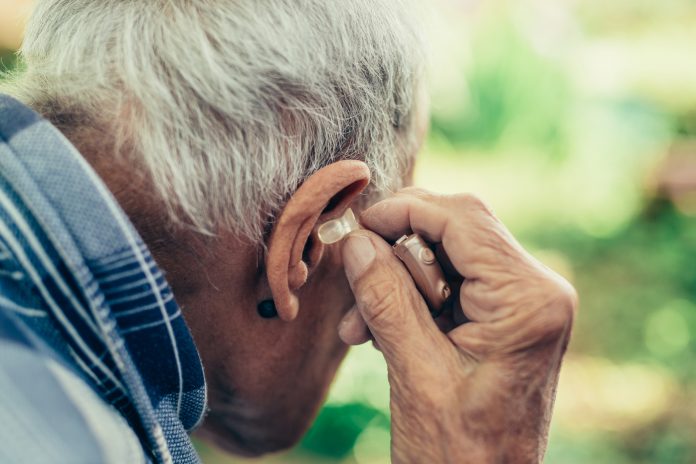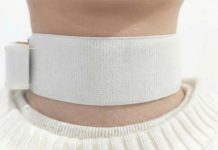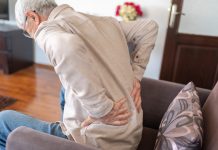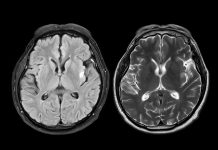Dr Tracey Pollard from RNID, the charity which supports the 12 million people in the UK who are deaf, have hearing loss or tinnitus, talks us through the causes and impact of hearing loss and how RNID is working to improve research and related treatments in this field
Age-related damage to the inner ear (presbycusis) is the main cause of hearing loss – 40% of adults over the age of 50 in the UK have hearing loss. (1) Age-related hearing loss usually affects both ears and worsens over time.
The main cause of age-related hearing loss is gradual wear and tear to tiny sensory cells called hair cells in the cochlea (the hearing organ in the inner ear). Hair cells constantly take in information about sound from the environment, convert that information into an electrical format that the brain can interpret, before transmitting it to the brain. As a result, hair cells never stop working – even when someone is sleeping. Over time, they break down and stop working so effectively. People cannot regenerate hair cells, so if they are damaged in this way, they are not replaced. This loss of hair cells ultimately causes hearing loss.
Age-related hearing loss typically begins with the loss of high-frequency or high-pitched sounds. This may make some voices harder to hear and some speech sounds, such as ‘s’, ‘f’ and ‘th’ sounds, harder to pick up. This can make it difficult to listen to what people are saying if there is a lot of background noise.
Over time, the hearing loss will spread to lower-pitched sounds and become progressively worse. At this point, people may struggle to hear someone talking, even in a quiet room.
What is noise-induced hearing loss?
People are exposed to sound in their environment every day – mostly, these sounds are at safe levels and do not damage hearing. However, if they become too loud, they can harm hearing and cause noise-induced hearing loss.
Exposure to loud noise is the second biggest cause of hearing loss after ageing. The World Health Organization estimates that one billion young people (between 12 and 35 years) are at risk of developing noise-induced hearing loss due to prolonged and excessive exposure to loud music and other recreational sounds. (2)
Noise-induced hearing loss can develop when:
- Someone works in a noisy environment – this could include working on a construction site or operating noisy machinery
- They are listening to music that is too loud at a concert or through headphones
- They are exposed to a very loud burst of sound, such as a gunshot.
Noise levels are measured in dB(A) or decibels. Prolonged exposure to sounds over 80 dB(A) can damage hearing; the louder the sound is, the less time someone can be exposed to it before it will damage their hearing.
Noise-induced hearing loss can develop immediately after exposure to a very loud noise, or it may develop gradually over time – it may take several years for the effects to show up. In some cases, tinnitus (ringing in the ears) may be the first sign of hearing damage from noise exposure. Sometimes, a person may develop temporary hearing loss after noise exposure, and then their hearing returns to normal. However, research suggests that there may be subtle changes to their hearing as a result.
People with noise-induced hearing loss usually experience a dip in hearing in the high frequencies. This means that they will not be able to hear high-pitched sounds as well as they can hear sounds at lower pitches. If the noise exposure continues, the hearing loss will spread to lower and higher frequencies.
How does over-exposure to sound damage hearing?
Most noise-induced hearing loss is caused by damage to the sound-sensing cells in the inner ear, the hair cells. Hair cells detect sound waves in the air (a mechanical vibration) and convert them into an electrical signal that the brain can interpret. It then transmits this signal to the brain via the auditory (or hearing) nerve. The louder a sound is, the more energy the sound waves contain and the more physical force they exert on the inner ear and the hair cells. If a sound is too loud, it will physically damage the hair cells, and they may ultimately die. People only have the hair cells they are born with – they do not regenerate when lost. If hair cells die after loud noise exposure, this causes permanent hearing loss.
How does hearing loss impact a person’s quality of life?
People with hearing loss often find it difficult to communicate with friends and family, colleagues and health professionals, making them feel socially isolated. Research shows that hearing loss increases the risk of developing depression (3), anxiety and other mental health problems. (4) People with age-related hearing loss are also at increased risk of developing dementia. (5)
There is no cure for hearing loss, but many people use hearing aids to hear better in everyday situations.
Research into treating age-related and noise-induced hearing loss
There are currently no treatments for age-related or noise-induced hearing loss that can restore lost hearing or prevent it from developing in the first place. Researchers are working to understand more about the molecular and cellular processes that underlie these types of hearing loss and use these findings to develop new treatments.
RNID funds research into preventing these types of hearing loss and finding ways to restore hearing once it has been lost. This includes research to find effective ways to deliver treatments to the inner ear, which is difficult to access from both the external ear and the internal blood supply.
Since we started funding medical research in 1999, RNID-funded researchers have:
- Linked 44 genes to age-related hearing loss. (6) These genes could provide useful targets for drug treatments to prevent age-related hearing loss
- Improved how we grow inner ear tissue in the lab so that it more closely resembles the cellular environment in the body. (7) This will help researchers to identify and test new treatments to restore hearing;
- Shown that human stem cells can be used to repair damage to the auditory nerve and restore hearing in gerbils. (8) Based on this research, a company (Rinri Therapeutics) is aiming to start clinical trials of this treatment in people in the next couple of years
We are also currently funding research projects to:
- Understand how exposure to loud noise affects the development of age-related hearing loss;
- Improve the delivery of drug treatments to the inner ear;
- Understand whether gene therapy could be used to restore hearing, including from age-related hearing loss;
- Find ways to encourage hair cells to re-grow in the inner ear.
We also work with researchers across the breadth of academia and industry, as well as clinicians, investors and regulators through our Hearing Therapeutics Initiative – set up to help speed up the development of treatments for hearing loss and support them towards testing in clinical trials.
What if I think I have hearing loss?
If you think you might have hearing loss, you can check your hearing in just three minutes via RNID’s free online hearing check.
References
- https://rnid.org.uk/get-involved/research-and-policy/facts-and-figures/prevalence-of-deafness-and-hearing-loss/
- https://www.who.int/news/item/02-03-2022-who-releases-new-standard-to- tackle-rising-threat-of-hearing-loss
- https://www.ncbi.nlm.nih.gov/pmc/articles/PMC6008216/
- https://www.sciencedirect.com/science/article/abs/pii/S0378512217309970
- https://pubmed.ncbi.nlm.nih.gov/21320988/
- https://pubmed.ncbi.nlm.nih.gov/31564434/
- https://www.embopress.org/doi/full/10.15252/embr.201643732
- https://europepmc.org/article/MED/22972191








